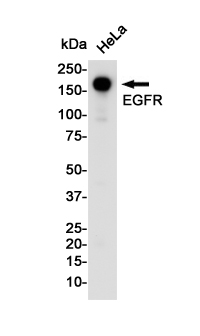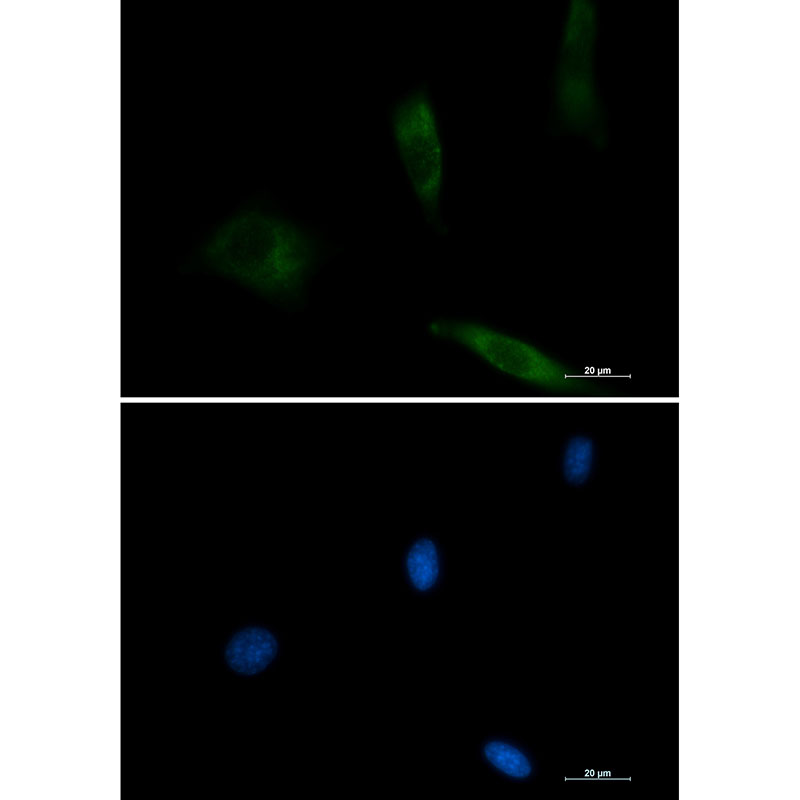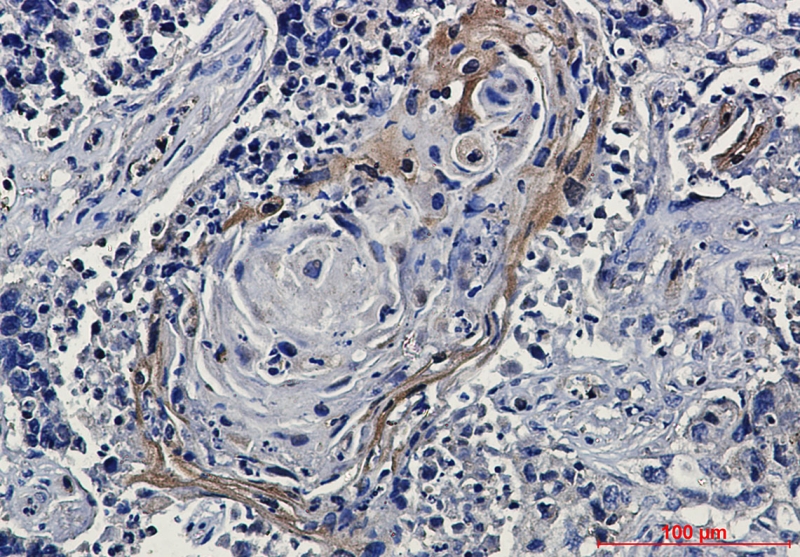


| WB | 1/500-1/1000 | Human,Mouse,Rat |
| IF | 1/20 | Human,Mouse,Rat |
| IHC | 1/50-1/100 | Human,Mouse,Rat |
| ICC | 1/50-1/200 | Human,Mouse,Rat |
| FCM | 咨询技术 | Human,Mouse,Rat |
| Elisa | 咨询技术 | Human,Mouse,Rat |
| Aliases | EGFR; ERBB; ERBB1; HER1; Epidermal growth factor receptor; Proto-oncogene c-ErbB-1; Receptor tyrosine-protein kinase erbB-1 |
| Entrez GeneID | 1956 |
| WB Predicted band size | Calculated MW: 134 kDa; Observed MW: 175 kDa |
| Host/Isotype | Rabbit IgG |
| Antibody Type | Primary antibody |
| Storage | Store at 4°C short term. Aliquot and store at -20°C long term. Avoid freeze/thaw cycles. |
| Species Reactivity | Human,Mouse |
| Immunogen | A synthetic peptide of human EGFR |
| Formulation | Purified antibody in TBS with 0.05% sodium azide,0.05%BSA and 50% glycerol. |
+ +
以下是关于EGFR抗体的3篇参考文献,简要概括如下:
1. **"Cetuximab and Chemotherapy as Initial Treatment for Metastatic Colorectal Cancer"**
- **作者**: Cunningham, D. et al.
- **摘要**: 该研究(2004年发表于《新英格兰医学杂志》)表明,西妥昔单抗(Cetuximab)联合标准化疗(如伊立替康)可显著延长EGFR阳性转移性结直肠癌患者的总生存期和无进展生存期,且耐受性良好。
2. **"Cetuximab plus Radiotherapy in Head and Neck Cancer"**
- **作者**: Vermorken, J.B. et al.
- **摘要**: 该研究(2008年发表于《新英格兰医学杂志》)显示,西妥昔单抗联合放射治疗可显著提高局部晚期头颈部鳞癌患者的生存率,且未明显增加放疗毒性,确立了其在头颈癌中的一线地位。
3. **"Panitumumab versus Cetuximab in Patients with Chemotherapy-Refractory Wild-Type KRAS Colorectal Cancer"**
- **作者**: Van Cutsem, E. et al.
- **摘要**: 研究(2014年发表于《柳叶刀肿瘤学》)对比帕尼单抗(Panitumumab)与西妥昔单抗在KRAS野生型转移性结直肠癌中的疗效,结果显示两者生存获益相似,但帕尼单抗的输液反应发生率更低。
4. **"Nimotuzumab in Combination with Irradiation for Advanced Esophageal Cancer"**
- **作者**: Li, X. et al.
- **摘要**: 该研究(2019年发表于《Cancer Medicine》)表明,尼妥珠单抗(Nimotuzumab)联合同步放化疗可显著改善晚期食管癌患者的客观缓解率和局部控制率,且安全性优于传统EGFR靶向药物。
以上文献均为EGFR抗体在不同癌症类型中的关键临床研究,涵盖单药及联合治疗的疗效验证。
**Background of EGFR Antibodies**
The epidermal growth factor receptor (EGFR), a transmembrane tyrosine kinase receptor in the ErbB family, plays a critical role in regulating cell proliferation, survival, and differentiation. Dysregulation of EGFR signaling—through overexpression, mutations, or ligand-dependent activation—is implicated in various cancers, including non-small cell lung cancer (NSCLC), colorectal cancer, and head/neck malignancies. This makes EGFR a key therapeutic target.
EGFR antibodies, primarily monoclonal antibodies (mAbs), are designed to block ligand binding or receptor dimerization, inhibiting downstream signaling pathways like RAS/MAPK and PI3K/AKT. Cetuximab and panitumumab, first-generation anti-EGFR mAbs, bind the receptor’s extracellular domain, preventing activation. They are used in metastatic colorectal and head/neck cancers but face limitations due to resistance mechanisms, such as KRAS mutations or EGFR alterations (e.g., T790M).
To address resistance, next-generation antibodies and tyrosine kinase inhibitors (TKIs) like osimertinib (targeting EGFR T790M) were developed. Additionally, antibody-drug conjugates (ADCs) and bispecific antibodies are being explored to enhance efficacy. Challenges include managing adverse effects (e.g., skin toxicity) and overcoming tumor heterogeneity. Research continues to optimize EGFR-targeted therapies through combination regimens and biomarker-driven approaches.
×